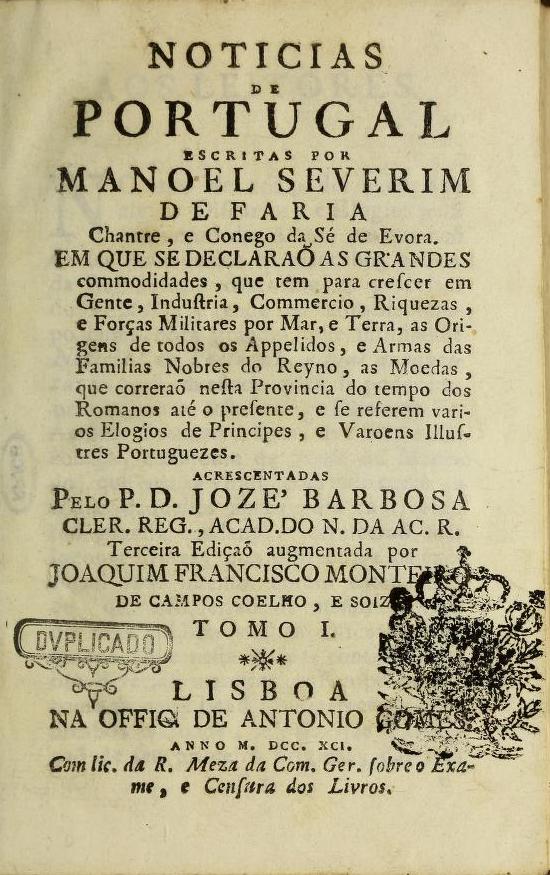Noticias de Portugal
Annotation
Suggestion for handling orphans, devised in 1655 by Manoel Severim de Faria, an official for the bishop of Evora in Portugal. Here Severim de Faria speaks about the role orphaned children could and should play in the Portuguese empire. Students need to know that most orphans in early modern Europe were taken into the home of a relative, but some were placed in public or church orphanages, in which their chances of survival were not great. As they read the document, students learn that Severim de Faria sees orphans within the context of social problems—including a shortage of sailors, vagrancy, and underpopulation—and their solutions. He proposes gender specific solutions: boys are to work on ships and learn how to sail them better, girls are to get married and have more children.
This source can be used as a springboard to broader discussion of many things: gender differences in young people's experiences, attitudes toward children and towards the poor, marital patterns in which women were expected to bring a dowry, coerced migration, and the role of children in colonial expansion. This document is only a plan, but such proposals were followed by several early modern governments and private companies.
This source is a part of the Orphans and Colonialism (17th c.) teaching module.
Text
In this regard it is convenient and of great value to Portugal, given the great multitude of foundlings and [male] orphans that exist in this Realm, who could be of great utility to the Republic, [if] raised in proper doctrine and placed in trades. It is more expedient to use this remedy in maritime regions, such as Lisbon, Setúbal, Porto, Viana, and in the Algarve; for in these [places], orphans and the abandoned once taken into custody could supply ships with cabin-boys, and swabbers for vessels, and sailors, all of whom there is a great shortage in this Realm. The proper teaching and training would be of great profit to our navigations, for there is a common lack of breeding geared toward men of the sea, as we have seen in so many shipwrecks and losses, of which there are many complaints. With this remedy we will also stop many of those who pretend to be poor, or who are vagabonds in this Realm, and they will occupy themselves in honest work. This will be of benefit to the Republic, and with this the number of residents in those locations would increase, and the population in the Realm.
This way of recruiting the orphans is so well-known that already in 1641 the members of the Cortes [the Portuguese parliament] asked His Majesty with these words: "It would be greatly advantageous that in the amassing of young orphans we recruit many boys, and that an amount be applied for their sustenance, for they will be taught the art of seafaring, with which there will always be an abundance of mariners, of whom there is a great lack in this Realm." [They gave] the example of the hospital that the Queen of Castile set up in Madrid to train boys to be mariners due to the existing shortage of them. And the response from His Majesty is that he would order that which they asked of him.
The same that has been said for the relief and remedy of orphaned boys can be said of orphaned girls. This is better yet, [because] much more care must be given to them, for lack of support is a greater danger to them, for women have much less means of making a living than men. Thus it is appropriate that a remedy be found for them, by applying all the means that can exist to have these [female] orphans of the people get married: for besides the great service [this will provide] to Our Lord by removing the occasion for them to disgrace themselves, we will attain our aim of increasing the number of people with the multiplication of marriages. The City of Milan, which is the most populous in Europe, serves as an example of this; one of the reasons for its growth is the dowry it provides each year to 800 [female] orphans. The same can be seen in the increase that the city of Seville has had for some years; for whereas much of it was caused by the commerce with the Indies, we can also attribute it to the marriages that take place each year of a great number of [female] orphans. In that city there are chapels. . . founded exclusively with large endowments to marry many [female] orphans: besides this there are many hospitals. . . that each marry many young women, and there are many more [public and private charities] that with the surplus from their revenues carry out this act of charity.
To put this means to work: we say that some portion of municipal revenues could be used, where a surplus exists, or some revenue from the head tax could be assigned to this, which income could be used solely for this pious work. We would also ask all municipal judges and officials that whenever they find money or bequests left to spend on pious works that were not named by the testators, they order [this money] spent entirely on these weddings. And likewise other similar things could be found for this purpose.
Credits
Severim de Faria, Manoel. Noticias de Portugal, 3rd ed. Translated by Darlene Abreu-Ferreira. Lisbon: Na Offic. de Antonio Gomes, 1791 [1655], 57–63.
